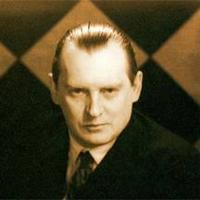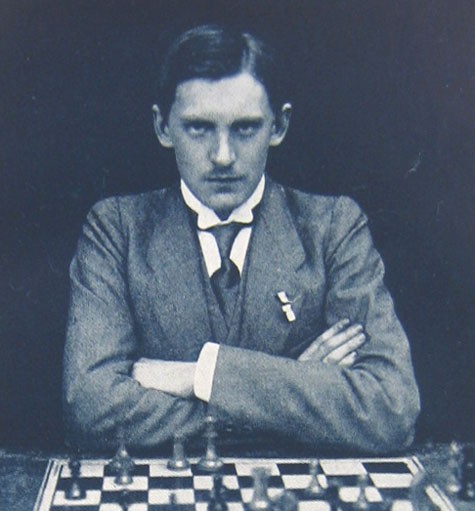
Alexander Alekhine (Part 1): The Game of Death
Imagine this is YOU
It’s 1918, and you’re one of the strongest chess players on earth. You live in Odessa, during one of Russia’s most chaotic periods. Trying to stay on top of the political upheaval, you take whatever side offers the best chance at survival. Unfortunately, being a captain in the tsarist army turns out to be the wrong choice, and you find yourself tossed into prison and sentenced to death by firing squad by Trotsky himself.
Doomed and waiting for the axe to fall, four days pass in your cell when the door opens and several people enter. One of them is Trotsky. A guard tells you that Trotsky wants to play a game of chess with you, and a board is set up and you end up with the white pieces. It quickly becomes clear that the “people’s commissioner” is no match for you, but when you can end the game and wipe him out with a few sharp moves you hesitate. What should you do? If you lose, will Trotsky be merciful and let you live? What will happen if you win? In fact, does it even matter? Most likely you’ll be shot in either case. You agonize, play some weak moves so the game can continue, and continue wondering what the best course will be.
What would you do?
This is the dilemma Alexander Alekhine faced. He kept the game going for a while longer, then silently cursed to himself and began the mating sequence that would drag down the black king. And then... he waited. Trotsky resigned, quietly rose up from his chair and left the room. Alekhine was released the next day.
Alekhine’s Early Years
Born in 1892 into an aristocratic, very wealthy family, Alekhine learned how to play chess at six or seven years of age. When he was nine (in 1902), he watched a simultaneous blindfold exhibition given by Pillsbury – seeing a foreign superstar give such an exhibition is a big deal for anyone, but it can easily be a turning point for child. Now hooked on chess, he immersed himself in his brother’s correspondence games and in 1905 he played in several correspondence tournaments. Like any beginner, his initial results were quite poor. However, he carefully analyzed each and every game (his and his brother’s), got stronger and stronger, and eventually was actually winning some of these events!
Alekhine had this to say about those early beginnings:
“I first heard about simultaneous blindfold games when I was nine. Moscow, my native town, was visited by Pillsbury who played 22 simultaneous games without looking at the chessboard. My brother Alexey took part in the event and drew. I viewed Pillsbury’s performance as a miracle! At the age of twelve I started to play without looking at the chessboard myself.”
This is significant since Alekhine eventually became one of the greatest blindfold players ever.
At the beginning of 1907, Alekhine joined the Moscow Chess Club. (He had to lie about his age to get in!) He played his first face-to-face tournament in the spring of that year (his result wasn’t anything special), and he continued his chess education by participating in both tournaments and short matches. Unlike Capablanca, who seemed to have been born with a silver pawn in his mouth, and unlike modern chess geniuses who earn the grandmaster title by the age of 12, Alekhine did things the old-fashioned way: he studied hard, used bad results as a learning tool, and by 1909 was quite a strong player (as shown by his clear first place finish in the All-Russian Amateur Tournament).

He followed this with an embarrassing drubbing (0-3) in a match vs. Nenarokov, a comeback wipeout (4 wins, 0 losses, 1 draw) against Blumenfeld, clear first in another correspondence tournament, and first place in two tournaments in Moscow (1909-1910). His big test occurred in Hamburg 1910 when he faced a gauntlet of old and upcoming legends. He ended up in seventh place (there were 18 players) behind Schlechter, Duras, Nimzowitsch, Spielmann, Marshall, and Teichmann.
In 1911 he had another try at the chess elite, this time ending up in eighth place (26 players) behind Teichmann, Rubinstein, Schlechter, Rotlewi, Marshall, Nimzowitsch, and Vidmar. He continued the “win some and lose some” template, carefully mending the flaws in his game. At this point he was clearly in the world’s top 12.
These sub-par results are the real story behind Alekhine’s journey to the highest title. A tactical genius with a wonderful imagination, his downfall was positional chess and the endgame. He realized that (by 1913 and 21 years of age) if he wanted to achieve his goal of world domination he would have to excel in every phase of the game – tactical genius alone wouldn’t get the job done.
By 1914 his hard work started paying off and a string of impressive results (equal first in Paris, equal first in the All-Russian Championship, and third behind Lasker and Capablanca in the legendary St Petersburg event) propelled him to the top five in the world. However, he was honest enough to realize that though he wasn’t afraid of anyone, both Lasker and Capablanca were his superiors. Due to Lasker’s age, Alekhine was positive that Capablanca would eventually be World Champion, so he dedicated himself to increasing his skills in all the areas Capablanca excelled in. Alekhine knew this would take a long time to accomplish, but it was his life goal and nothing was going to prevent him from achieving it.
I should add that though 1914 housed his coming out party as an elite player, it also acted as a stumbling block to his success. World War 1 fell on his head during the super-strong Mannheim tournament (he was dominating the event with nine wins, one draw and one loss).

This led to 11 Russian players being interned in Germany. Some sources say he was released later and made his way back to Russia. Other sources offer a more romantic tale.
Anthony Guest, the chess correspondent of the Morning Post, wrote this in October 1914:
“The brilliant Russian master, Alekhine, who was one of the tournament competitors stranded at Manheim on the outbreak of war, paid a surprise visit to London on Friday (October 9), on his way back to St. Petrograd. Calling at the Chess Divan, 110 Strand, he gave an interesting account of his experiences. Alekhine was the only one of the French and Russian representatives to get away, nine of them still being detained at Baden-Baden, or at Mannheim, where Janowski remains. It is astonishing to hear that the German Chess Association, which has several influential members, left these players to shift for themselves. They were a fortnight in prison, where they were brutally treated by German soldiers who, from sheer savagery, assaulted them with the butt ends of their rifles. These competitors will have to remain in Germany till the end of the war, with the solitary exception of Alekhine, who escaped at the risk of his life. A friend gave him his own pass, and by means of this the young Russian got across the border, knowing that if the deception was discovered he would be shot at once.”
The war years were hard on Alekhine, though when he managed to play (only in Russia) he always won (aside from his wartime tournament victories, he crushed Rabinovich in a four-game match via three wins and one draw, and Verlinsky by the lopsided scored of 6-0). His victory at the Moscow Championship (late 1919/early 1920) – a clean sweep of 11-0, and his win at the first USSR Championship (nine wins, six draws, no losses) made his enormous strength clear to all. Nevertheless, he was still a distant third behind those two superhuman monsters, Lasker and Capablanca.
When Capablanca took the world title from an aging Lasker, Alekhine’s ultimate goal was clear: continue to improve and take the World Championship from the Cuban genius. [We’ll continue Alekhine’s march to the title in Part Two of this series.]
Before going into our puzzles, I would like to share an Alekhine loss (when he was 15 years old) that showed his aggressive style. Fortunately for chess, one-dimensional aggression (no matter how creative it might be) doesn’t always lead to victory! Pay special attention to the outrageous pawn structure that occurs!
30.g4
Rome is burning on the queenside, so Alekhine goes all-in on the opposite wing!
30...bxa4 31.gxf5??
At that time Alekhine’s credo was “No retreat, no surrender!” I might add, “No defense!” The older, more mature Alekhine would have realized the attack wouldn’t work and played the sane 31.bxa4 Bxa4 32.Qe1! Bc2 (32...Bb5 33.Rg1) 33.gxf5 exf5 (33...Bxb1 34.Qxb1 Qxb1 35.Rxb1 [Threatening 36.Rb8] 35...Kf8 36.Nb3! Rxe3 37.Nc5 exf5 38.Ra1 Nc6 39.Ne6+! Kf7 40.Rxa6 Kxe6 41.Rxc6+ and White is okay) 34.Ba2! Qa5 35.Nb1! Bxb1 36.Bxb1! g6 37.Rg1 Ra3 38.Qh4 Ra1 39.Qe7 Rxb1 40.Rxb1 Qa2+ 41.Kg3 Qxb1 42.Qxd8+ =.
31...Bb5
Now Black’s winning.
32.Nc4 Rxb3 33.fxe6
Do or die, all or nothing!
33...dxc4 34.Qf3 Rxb1 35.Rxb1 Qxb1 36.e7 Ne6 37.d5 Qg6 38.dxe6
Quadrupled pawns! Incredible and very rare.
38...Qe8 Oh well, that ends all the threats. White resigned in a few more moves. So much for the power of quads.
Puzzles From The Games Of Teenage Alekhine!
[Most of the puzzles offer invisible prose and variations. After you try and solve the puzzle, click SOLUTION followed by MOVE LIST so you can see all the hidden goodies.]
Puzzle 1:
White to move but Black resigned without waiting for White’s reply. Why?
Puzzle 2:
In puzzle 2 Alekhine was in serious trouble but Black made a mistake and his tactical skills bailed him out. His comment about this game:
“It is possible that this game exerted a profound effect on my subsequent play and development. Certainly it stimulated my ambition and my desire to improve. On the other hand it endowed me with a curious psychological weakness which I had to work hard and long subsequently to eradicate – if I ever have eradicated it! – the impression that I could always, or nearly always, when in a bad position, conjure up some unexpected combination to extricate me from my difficulties. A dangerous delusion!”
Puzzle 3:
RELATED STUDY MATERIAL
- Watch GM Melikset Khachiyan's video My Memorable Games: Reckless Abandon! about executing ideas aggressively;
- Read GM Gregory Serper's series The Truth About Doubled Pawns: Part 1, Part 2, Part 3, Part 4, Part 5;
- Read IM Bryan Smith's article The Young Alekhine;
- Watch GM Roman Dzindzichashvili's video Greatest Chess Minds: Alexander Alekhine;
- Read GM Arkadij Naiditsch's article Alekhine-Magic on the Chessboard! on a game from 1925;
- Improve your tactics in general (always a good idea!) with our Tactics Trainer.






